I finally got to see the Revue Starlight Movie, and it was incredible.
 The anime series, which the movie follows up on, was mostly about main character Karen Aijo refocusing on her acting ability in order to star in a lead role of the musical stage play Starlight alongside her childhood friend Hikari. Their determination to fulfill their promise to be stars together helped show the other stage actresses at their musical theater academy what it really meant to be Stage Girls. The show beautifully explored the motivations of each of the nine main cast members by pitting them against each other in one on one magical musical stage battle Revues where they fought with swords and axes and bows, but where their drive and stage presence determined who won the day. Ultimately, Karen and Hikari’s promise brought together their entire class as friends who now realized that being the one exclusive Top Star wasn’t all there was to musical theater. It drove home the message that even when you fail you can always stand up and try again.
The anime series, which the movie follows up on, was mostly about main character Karen Aijo refocusing on her acting ability in order to star in a lead role of the musical stage play Starlight alongside her childhood friend Hikari. Their determination to fulfill their promise to be stars together helped show the other stage actresses at their musical theater academy what it really meant to be Stage Girls. The show beautifully explored the motivations of each of the nine main cast members by pitting them against each other in one on one magical musical stage battle Revues where they fought with swords and axes and bows, but where their drive and stage presence determined who won the day. Ultimately, Karen and Hikari’s promise brought together their entire class as friends who now realized that being the one exclusive Top Star wasn’t all there was to musical theater. It drove home the message that even when you fail you can always stand up and try again.
The movie simply asks: Then what?
 For Karen, the driving force in her life ever since she was a child has been her powerful but naive promise to star beside her friend in one particular play. She did that. So, what happens to her determination and drive once she achieves her goal? For the others, the movie takes a deeper look into places the show left them at in relation to their friends. All of them are graduating soon. Where will they go? What stage will they seek out? How will being pulled apart after graduation affect their relationships with each other?
For Karen, the driving force in her life ever since she was a child has been her powerful but naive promise to star beside her friend in one particular play. She did that. So, what happens to her determination and drive once she achieves her goal? For the others, the movie takes a deeper look into places the show left them at in relation to their friends. All of them are graduating soon. Where will they go? What stage will they seek out? How will being pulled apart after graduation affect their relationships with each other?
Like the series, the movie is more a spectacle than a story. The heart of the movie, as was true of the heart of the show, are its incredibly artistic and deeply layered Revues. In them, stage combat set to awesome musical duets filled with vivid, imaginative imagery see the girls’ desires and motivations clash against each other in order to reveal their true feelings.
 Should they continue to take their acting seriously after they graduate? How do you support one another if you both want to be stars rather than merely a leader and a follower? Can fear, rivalry, and jealously be channeled for a greater good? What happens if one person wants to take a different path than the other wishes for them? How can a honest, heated rivalry help drive people to greater heights? It’s these kinds of things that are explored in the midst of battles set in a variety of locations like the top of speeding subway trains, within olympic sports competitions, or as part of over the top stage dramas set inside other stage dramas.
Should they continue to take their acting seriously after they graduate? How do you support one another if you both want to be stars rather than merely a leader and a follower? Can fear, rivalry, and jealously be channeled for a greater good? What happens if one person wants to take a different path than the other wishes for them? How can a honest, heated rivalry help drive people to greater heights? It’s these kinds of things that are explored in the midst of battles set in a variety of locations like the top of speeding subway trains, within olympic sports competitions, or as part of over the top stage dramas set inside other stage dramas.
Art and Sound
The Revue Starlight Movie is animated beautifully with many different settings featuring tons of bold, bright colors and well thought out designs. This is easily the prettiest Revue Starlight has ever been. With the movie-level budget and lack of week to week tv show deadlines, the team was able to really stretch their legs as compared to the tv series while still matching it stylistically. In some ways, the Revue Starlight art style is a bit simpler than the “animated realism” you see from movies like Belle or Your Name. Backgrounds are a bit more painterly and a bit less complex, for instance. But that doesn’t mean the movie skimps on lighting or location design or animation. Revue Starlight has always been very aware that it’s job is to portray the grandeur of the stage, and the movie does just that on numerous occasions.
The magical Revue battles, which were always the artistic high points of the series, are even more so in the movie. There’s just a bit of extra lavishness to all of them. If the big episode eight fight between Hikari and Banana with its dramatic tension and incredible scene changes was the high bar for the series, it would be something closer to the minimum level of extravagance for most of the Revues in the movie. There are stunning scene changes, killer outfits, great use of wide shots and of close ups, and just a general heaping of theatrics infused within every scene.
The music in the movie is just as wonderful. There are definitely a bunch of callbacks. One of my favorites is a new slow instrumental version of “Knowledge of a Stage Girl” that does a wonderful job of enhancing a tender moment at the party kicking off the girls’ final theater festival. There’s also a bunch of great new music. All the new Revues, of course, have their own full length scores, and they are awesome. The visuals of the Revues are all outstanding, but the music isn’t left behind at all. Some of the most powerful moments come precisely because the way the music and visuals come together.
Throughout it all, this movie is still very much Revue Starlight… meaning it just oozes stunning theatrics from beginning to end, all heavily smothered in layers of intriguing metaphor. Like, why does a tomato explode in the middle of an endless desert just seven seconds into the film? Or, why, at one point, do we see the girls in their normal street clothes standing over themselves in their more ostentatious Revue outfits lying dead soaked in blood, which may or may not be tomato juice. What does it mean for a subway car to transform into a moving battleground? What does it mean to have one person who was engaged in an on-stage duel with a rival to suddenly vanish then reappear while clapping for their opponent from the seats of the audience? It’s kinda amazing how much of the movie’s visual grandeur exists to both be pleasing to the eye but to also prompt further thought. This is a movie that can be analyzed for days and days and still have more to show you.
All In All
 The Revue Starlight Movie, like the show, is different from most any other anime out there. It is theatrics and hand to hand combat and catchy duets and constantly shifting imagery and fourth wall breaks that all serve to peel back the layers of its characters’ motivations. I think it is brilliant, but you have to be willing to both revel in its overwhelming spectacle but also be willing to put all that aside and look beyond the flash to see the interesting character moments waiting beneath. If you’re able to do so, you’ll find a series and a follow up movie that will blow you away with how well they are put together and how much fun they are.
The Revue Starlight Movie, like the show, is different from most any other anime out there. It is theatrics and hand to hand combat and catchy duets and constantly shifting imagery and fourth wall breaks that all serve to peel back the layers of its characters’ motivations. I think it is brilliant, but you have to be willing to both revel in its overwhelming spectacle but also be willing to put all that aside and look beyond the flash to see the interesting character moments waiting beneath. If you’re able to do so, you’ll find a series and a follow up movie that will blow you away with how well they are put together and how much fun they are.
 One word of warning, you absolutely have to have seen the show before you start the movie. The Revue Starlight Movie just assumes you know what happened before and goes straight to what happens next. On the bright side, this means it doesn’t bog down at the beginning reminding you of what you already know, but it also means that you won’t really understand the characters or their actions very well at all if you haven’t seen the show.
One word of warning, you absolutely have to have seen the show before you start the movie. The Revue Starlight Movie just assumes you know what happened before and goes straight to what happens next. On the bright side, this means it doesn’t bog down at the beginning reminding you of what you already know, but it also means that you won’t really understand the characters or their actions very well at all if you haven’t seen the show.
There’s a ton more to talk about, so, if you’ve seen the movie, expand the section below and come Dig Deeper with me!
Each of the movie’s six Revues are awesome, eclectic weldings of singing, dancing, acting, stage combat, music, and orchestration. Like in the series, they all take place in a fictional, magical space, though this time the movie integrates this “Stage of Fate” a bit more directly into the real world whereas the series basically saw it solely located underneath the girls’ musical theater academy. Every one of these Revues is highly metaphorical and highly layered with details big and small.
I promise I did not notice all the nuance and subtle references. Some of the stuff is simply impossible to catch unless you are a native Japanese speaker, and I’m not one. But, I tried my best to share some insights and interpretations of each Revue. Please let me know if you noticed something I didn’t or if you you have a different opinion.
Revue of Annihilation
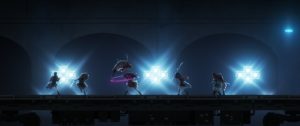 Banana fought and struggled for so long to keep herself and her classmates trapped in a time loop where everyone lived out the same happy year over and over. In the series, that loop was eventually broken and time began moving forward again. If there’s anybody that knows that you have to focus on what comes next, it’s Diba Nana. This whole Revue is her taking out her frustration on her friends who have kinda become more interested in bickering among themselves than focusing on where it is they will each go next. It’s Banana telling them that no matter where they go they need to be prepared for a new fight because just accomplishing a successful theater production in the past doesn’t mean landing a new role on a new stage will be automatic or a given in the future.
Banana fought and struggled for so long to keep herself and her classmates trapped in a time loop where everyone lived out the same happy year over and over. In the series, that loop was eventually broken and time began moving forward again. If there’s anybody that knows that you have to focus on what comes next, it’s Diba Nana. This whole Revue is her taking out her frustration on her friends who have kinda become more interested in bickering among themselves than focusing on where it is they will each go next. It’s Banana telling them that no matter where they go they need to be prepared for a new fight because just accomplishing a successful theater production in the past doesn’t mean landing a new role on a new stage will be automatic or a given in the future.
Banana is one of the most gifted actresses among our nine main Stage Girls and she finally gets a chance to show that off brilliantly. She takes on everyone at once and takes them apart with ease. Pay attention to her lyrics. In the second half of the battle, the words she is singing are direct criticisms of the faults of the other girls as she defeats them in battle. Only Maya, who already understands the coming battles of her next stage, is able to stand up to Banana. It’s fitting then that she is the only one that Banana does not criticize.
 The music here is interesting because it is somehow both frantic but monotone at the same time. I think it’s the perfect representation of Banana. Incredibly talented, but bursting with an over the top intensity that sorta flattens everything out. Both she and the music are a bit too intense to have a proper, normal range.
The music here is interesting because it is somehow both frantic but monotone at the same time. I think it’s the perfect representation of Banana. Incredibly talented, but bursting with an over the top intensity that sorta flattens everything out. Both she and the music are a bit too intense to have a proper, normal range.
Ultimately, Banana is trying to be helpful. Trying to show them that they must chart their own courses or die as Stage Girls. She is even trying to be encouraging to Karen who she almost straight up asks “what will you do next?”. While off the stage, Diba Nana is everyone’s gentle, hard working, lovable “Banana” who cooks them meals and gives them back rubs. But, while on the stage, she is harsh and fearsome, and wholly devoted to her craft. That second one is the Banana we are seeing in this Revue.
Junna’s comment at the end after Banana cuts off her cloak so dismissively relates to how usually Banana is lovable and supportive. It’s rare to see her in full on full intensity acting mode.
Revue of Malice
 In some ways this is still the hardest Revue to wrap my head around. Why are Futaba and Kaoruko fighting again if they made up and were “fine” by the end of their Revue in the series? The answer is they weren’t fine! They just put that fact aside for a while longer.
In some ways this is still the hardest Revue to wrap my head around. Why are Futaba and Kaoruko fighting again if they made up and were “fine” by the end of their Revue in the series? The answer is they weren’t fine! They just put that fact aside for a while longer.
In reality, Kaoruko had been using Futaba for most of their lives. Relying on her. Taking her for granted. Taking advantage of her in so many ways. From having Futaba buy her food and candy, to using her as free transportation, to having her wake her up in the morning and more. Kaoruko took so much and offered so little in return.
And that might have been fine, if Kaoruko had simply cheered Futaba on as her friend devoted herself to becoming a better Stage Girl. Instead, Kaoruko got jealous. And though she got better about fending for herself at the end of their episode, she apparently never really did help or encourage her lifelong friend.
This Revue is a breakup, but it’s also very interesting thematically! In a couple of ways:
1. The beginning with Kaoruko and Claudine is a homage to Samurai movies where the challenger comes to call out their rival in order to duel them and ultimately kill them. I love how both Kaoruko and Claudine play their proper parts thanks to the magic of the Revues.
2. Think about the roles Kaoruko and Futaba play once we reach the cabaret portion of the Revue. In the real world Takarazuka Revue system, which Revue Starlight is heavily based on, the Top Star is always an Otokoyaku. A girl playing a male role. But here we have Kaoruko, someone who earlier in the film was fretting over whether the Auditions had started again because someone else might become Top Star, now playing a Musumeyaku role! A female role. Sure, she is glamorous and sexy and angry, but it is Futaba playing the more prestigious role! That’s important.
 Although this Revue started with Kaoruko and Claudine, I think it is really Futaba’s Revue. “It’s not fair!” She keeps saying. “Why won’t you understand?!” And finally “We can’t go together anymore!” Futaba has decided her own advancement as a Stage Girl is more important than the unfair relationship she has had with Kaoruko all her life. And I say good for her!
Although this Revue started with Kaoruko and Claudine, I think it is really Futaba’s Revue. “It’s not fair!” She keeps saying. “Why won’t you understand?!” And finally “We can’t go together anymore!” Futaba has decided her own advancement as a Stage Girl is more important than the unfair relationship she has had with Kaoruko all her life. And I say good for her!
But there is one thing at the end that shows the love Futaba still has for Kaoruko. She lends Kaoruko her bike. The bike is more than simply a bike. It’s a symbol of all the years Futaba spent supporting Kaoruko. I think it’s Futaba’s way of saying “I can’t be with you right now, but I won’t just abandon you. I’ll still support you the ways I can.” That’s pretty awesome. In the series, Kaoruko learned to assert herself and stop relying on Futaba so much. Hopefully she can learn to appreciate Futaba properly at some point in the future… But for now, I think this may be the most bittersweet of all the Revues as there is little sign that things might one day end well.
Revue of Competition
 “Mahiru has gone nutty again,” someone on Twitter said. But that’s not the case. In this Revue, Mahiru both puts on the performance of her life and does the right thing by convincing Hikari to apologize to Karen for leaving after performing Starlight with her. Mahiru is shown competing in lots of Olympic sports, but her real role here is that of the caring big sister, once more, just like she used to be to her siblings back home.
“Mahiru has gone nutty again,” someone on Twitter said. But that’s not the case. In this Revue, Mahiru both puts on the performance of her life and does the right thing by convincing Hikari to apologize to Karen for leaving after performing Starlight with her. Mahiru is shown competing in lots of Olympic sports, but her real role here is that of the caring big sister, once more, just like she used to be to her siblings back home.
I love the sports angle of the Revue. Especially the way that Hikari and Mahiru keep switching from their Revue costumes to competing in the various sports. The back and forth instant transitions are really cool. The quick sequence that goes from Hikari throwing her dagger to tennis to volleyball to baseball is just incredible! I also wonder a bit if this Olympics Revue was included because Tokyo was hosting the Olympics the year this movie came out in Japan.
 Mahiru does get scary for a bit during this Revue, and its great how the music shifts from her fun, goofy sports theme to something much more frightening, but it’s all an act to scare Hikari into doing the right thing. Into apologizing to Karen both for leaving recently, and maybe for the way she ran away from Karen as a child and never made an effort to be her friend all those years they were apart. Mahiru knows she is not the best Stage Girl. That others will outperform her in singing and dancing and acting. But a hallmark of her character is the desire to help support others and make them smile.
Mahiru does get scary for a bit during this Revue, and its great how the music shifts from her fun, goofy sports theme to something much more frightening, but it’s all an act to scare Hikari into doing the right thing. Into apologizing to Karen both for leaving recently, and maybe for the way she ran away from Karen as a child and never made an effort to be her friend all those years they were apart. Mahiru knows she is not the best Stage Girl. That others will outperform her in singing and dancing and acting. But a hallmark of her character is the desire to help support others and make them smile.
I think Mahiru mainly did this for Karen, to help her when she is confused about where to go next. But, I think Mahiru also did it a little for Hikari and also for herself. She helped spur Hikari on, but she also proved to herself that she can act. Of all the Revues, this is the sweetest because Mahiru is a genuinely sweet person. Need even more proof? At the beginning of the scary part of her performance, Mahiru knocked the head off of Hikari’s Mr. White mascot. But at the end, one of the two figures holding the red finish line for Hikari is her Mr. White with its head taped back on. Mahiru fixed it just for Hikari! 🙂
Revue of Hunting
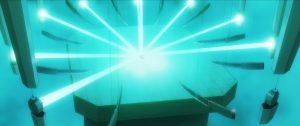 This may be my favorite Revue of the movie. Because it is so complex. Because it is emotional. Because it is two characters recognizing the faults in one another. And because, by clashing with each other and by calling each other out, they both find the things they had been looking for. Oh, and the music is excellent, too!
This may be my favorite Revue of the movie. Because it is so complex. Because it is emotional. Because it is two characters recognizing the faults in one another. And because, by clashing with each other and by calling each other out, they both find the things they had been looking for. Oh, and the music is excellent, too!
From Banana’s point of view, Junna was a Stage Girl who was at her brightest not because she was the most talented, but because she never stopped reaching for her goal, even if it was unachievable.
“Even though you couldn’t become the lead, the appearance of you foolishly, insistently reaching out your hand to the lead… It was dazzling.”
That quote is, of course, referring to Junna’s lines about herself from the series:
“Everyone has their own star. Stars that shine. The morning star. Stars that fall. Though I may not yet see my own star, I gaze upward and on this day I, Junna Hoshimi, will take hold of a star of my own.”
So, what changed? Why is Banana now urging Junna to give up completely. I think it’s because Banana see’s Junna’s chosen path as a form of giving up. Everyone else is going to some prestigious theater troupe or acting school. Junna? Her first choice is a literature department at a university! Meaning, she is withdrawing from being a Stage Girl. This plays into the criticism Banana threw at Junna (literally, in the form of her short sword) during the Revue of Annihilation:
“You can’t get by with nothing but words, don’t you know that?”
Now, she says of Junna:
“You’ve been blinded by the stars you can’t reach, and now you can’t see anything.”
Meaning, she thinks Junna was so in awe of others like Maya that she has given up trying to reach their level.
 Now, it’s true Junna was planning to withdraw from theater for a while in order to better understand the stage. But it’s so she can become an even better Stage Girl. That’s something Banana can’t see. Banana has a set role she sees Junna in and it never included Junna giving up.
Now, it’s true Junna was planning to withdraw from theater for a while in order to better understand the stage. But it’s so she can become an even better Stage Girl. That’s something Banana can’t see. Banana has a set role she sees Junna in and it never included Junna giving up.
In some ways Banana has a point. In some ways Junna has relied too much on the words of others and not enough in her own talent. Junna is very smart, but she doubts herself. She always ranks herself lower than others. And even though she claims to want to stand out, to be distinct from the others, Junna has always fought with a bow and almost always from the safety that comes from the height of her flying ring or the shadows at the edge of the stage she tends to hide in.
Banana’s harsh criticism very nearly breaks Junna. Visually, we see this as Banana breaking the crystal on Junna’s bow. It’s only after her best friend and roommate straight up tells her that she doesn’t feel a spark of glimmer in her acting that Junna finally begins to stand up for herself. We finally get to see a truly new side of Junna for the first time. It’s a side that partially agrees with Banana that the words of others are not enough. A side that agrees that just reaching for a star but with no hope of being able to land a lead role is not enough. This new Junna will still reach for her star, but now she will do so until she obtains a lead role. She finally has enough confidence in herself that she really thinks becoming a star is possible.
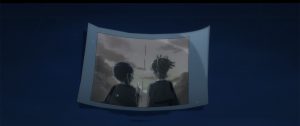 This also isn’t in Banana’s plans. Banana is used to the kind, sweet Junna who strives and strives but is ok with never achieving. She doesn’t understand this new Junna… and Junna calls her out on it! Junna says:
This also isn’t in Banana’s plans. Banana is used to the kind, sweet Junna who strives and strives but is ok with never achieving. She doesn’t understand this new Junna… and Junna calls her out on it! Junna says:
“I don’t need the role you’ve given me.”
And
“The one who is being blinded by the light is you.”
Dang. And, those aren’t just references to their current conflict. Those are references to Banana’s unending time loop from back in the series.
In the anime, when Banana and Junna met on the lawn after Hikari and Karen ended Banana’s reenactments, Junna was just there to be comforting to Banana. She gave Banana quotes that basically said everything was ok because everyone makes mistakes. She held Banana while she cried. She noted that even while controlling the lives of everyone and keeping everything perfect for everyone, Banana was still playing with the script of her time loop behind the scenes. She was still trying to make things even better, Junna acknowledged. Junna never criticized Banana… until now.
The reason Banana trapped everyone in her loop was because she was so blinded by the 99th Starlight that she didn’t want to even try to top it. To her, it was perfect, and by setting everyone’s roles in stone, she could protect everyone from hardship and failure. Junna’s responses about being given a role and about Banana being the one who was blinded are subtle but sharp, jagged criticisms of what Banana did to her and everyone else. What Junna is saying here is everyone, herself included, is trying to move forward while Banana is still blinded by the past. Maybe they aren’t moving forward in the way Banana would choose for them, but where they go and what they do in the future is not Banana’s choice to make. Junna, for the first time, is telling Banana she was wrong to trap them in a perfect world where they couldn’t change or grow. She is pointing out that it was Banana who was so blinded by her experiences that she would prevent her friends from moving forward. That’s pretty harsh from Junna, but I think it’s also pretty fair.
The Revue ends in a very interesting way. From Junna, we see clear confirmation that she has embraced a new confidence and sees herself eventually reaching a leading role on a stage of her own. And from Banana, she says something really neat:
“A brilliance like jewels set ablaze. I’ve finally arrived at it. Thank you Junna.”
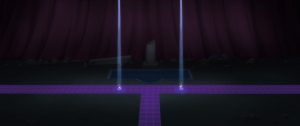 This is very noteworthy! The whole reason Banana looped again and again was to protect everyone from the pains of moving forward, yes, but in her own words, in the seventh episode of the series, she wanted to redo the 99th performance of Starlight because it was:
This is very noteworthy! The whole reason Banana looped again and again was to protect everyone from the pains of moving forward, yes, but in her own words, in the seventh episode of the series, she wanted to redo the 99th performance of Starlight because it was:
“…a brilliance like jewels set ablaze.”
It’s the same words, or very nearly the same words that she says in the movie! By reaching farther and higher than she ever dared reach before, Junna was able to show Banana something that equaled that first perfect performance of Starlight Banana could never manage to get out of her head. That’s very powerful. Banana now truly understands that she can find a new stage and she can find new moments that dazzle her like the 99th Starlight did.
I love that Banana finally found the one thing she could never reach even after hundreds of years of looping, and that it was her friend Junna who gave it to her! I really do hope they get to perform with each other again one day.
Gotta give a callout to the music here as well. It’s really interesting at how strongly it calls back to the Revue of Annihilation until Junna rises to power and shifts everything in her favor. The moment where she takes over the review is very powerful thanks in large part to the build up and climax the music goes through.
Revue of Souls
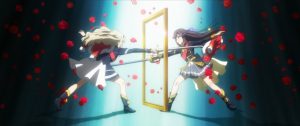 Here it is. The big Maya vs Claudine Revue that we never got during the series. We saw the aftermath of one, with the stage all destroyed and Claudine defeated, but beyond the intro to the show that showed Maya and Claudine crossing swords, we never got to see them fight each other. But now we have. And it was glorious.
Here it is. The big Maya vs Claudine Revue that we never got during the series. We saw the aftermath of one, with the stage all destroyed and Claudine defeated, but beyond the intro to the show that showed Maya and Claudine crossing swords, we never got to see them fight each other. But now we have. And it was glorious.
Sure, the Revue has awesome set design, awesome costumes, and a great call back to Maya’s first Revue with Karen, but it also gives us one thing we never truly got in the series. We get to see what Maya thinks about herself. All throughout the series, Maya Tendo was the perfect Stage Girl. She was always there to help. She always recognized and accepted and appreciated challengers. She was always giving correct advice to people like Kaoruko and Banana. But why? What was in it for Maya?
It turns out what was in it for Maya was living up to the expectations placed on her by everyone else. But, doing so always meant having to limit her own emotions and reign in her own desires. The Perfect Stage Girl is a part that she thought she had to play.
The problem seems to be that Maya has never been defeated. She has always been the best. And because of this she has always been full of pride and arrogance. Even Hikari and Karen weren’t true rivals for Maya. They managed to outshine her and Claudine momentarily, but they were so focused on each other and their childhood promise that who they were up against hardly mattered.
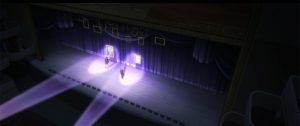 But then along comes Claudine, someone just as dedicated to the stage as Maya is. Someone who challenged Maya directly on the first day they met. Yes, Claudine had a bit of a shock when she found that Maya was her equal and maybe more, but we learned near the end of the series that Maya remembered being impressed by Claudine, as well, on their first meeting.
But then along comes Claudine, someone just as dedicated to the stage as Maya is. Someone who challenged Maya directly on the first day they met. Yes, Claudine had a bit of a shock when she found that Maya was her equal and maybe more, but we learned near the end of the series that Maya remembered being impressed by Claudine, as well, on their first meeting.
Now, the two finally recognize that yes, they are each other’s true rival. That no one else they’ve ever met compares to each other. And Maya in particular finds she has to truly go all out to compete with Claudine. I love that trio of lines they say to each other:
For heroes, there are trials.
For saints, there are temptations.
For me, there is you.
My mind is pulled off to Hercules and Odysseus and Joan of Arc. Epic figures in history that now Maya and Claudine count themselves among. It’s pretty freaking cool!
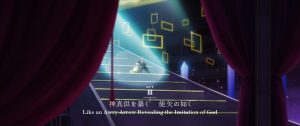 There’s another little part of this Revue that I missed the first time. When Maya and Claudine are playing their little board game, Claudine admits that she had lost her love for the stage. She says she was dying inside because she had enjoyed working under Maya so much that she didn’t want to seek out her next stage. This adds some interesting context to Claudine’s part of the Revue. Her desire to have Maya acknowledge her as a true rival is rooted back in the way she almost became content with being in second place during their episode 10 Revue duet.
There’s another little part of this Revue that I missed the first time. When Maya and Claudine are playing their little board game, Claudine admits that she had lost her love for the stage. She says she was dying inside because she had enjoyed working under Maya so much that she didn’t want to seek out her next stage. This adds some interesting context to Claudine’s part of the Revue. Her desire to have Maya acknowledge her as a true rival is rooted back in the way she almost became content with being in second place during their episode 10 Revue duet.
But now, we get a renewed Claudine who, for the first time ever, was able to beat Maya. It was important for Maya to come to terms with her feelings of stoicism and importance, but it was just as important for Claudine to rekindle that spark of competition within herself. By the end of the Revue both Maya and Claudine are truly ready to seek out their next stage and even ready to fight each other as friendly rivals for future roles.
Oh yeah… and that musical callback to Karen and Maya’s Revue of Pride right as Maya and Claudine run at each other… that was amazing! Another great callback was the way Claudine and Maya did their final dramatic introductions of themselves after switching to their Revue uniforms. Each is parroting and mocking the other’s introductions they gave from the latticework of the Tokyo Tower on the Stage of Fate before their Revue in episode ten against Karen and Hikari.
The Final Lines
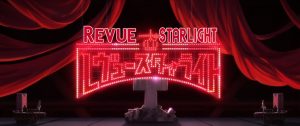 And finally, we come back around to Karen and Hikari. This Revue is certainly the most abstract of them all. It’s also one that most directly challenges where things left off in the anime. In some ways, it even reverses some of the strongest positions espoused by the main series.
And finally, we come back around to Karen and Hikari. This Revue is certainly the most abstract of them all. It’s also one that most directly challenges where things left off in the anime. In some ways, it even reverses some of the strongest positions espoused by the main series.
All throughout the movie we’ve been seeing flashbacks of how Karen came to truly love the stage and how her promise with Hikari went from a child’s simplistic promise to a driving force in her life. It wasn’t just a fleeting promise, it was something that Karen held onto tightly for more than thirteen years as she grew from a child to an adult. Was Karen a little naive? Sure. But her faith in her promise was rewarded in the end.
What this Revue points out is that no matter how heartwarming it was in the anime when Karen said, “My stage is you, Hikari,” it was also a deeply flawed position. I love how they showed how incredibly grateful Karen was to Hikari for giving her the inspiration to join school plays and train in dance and acting and to join Seisho Music Academy. But also how they showed just how solely focused Karen was on Hikari to a ridiculous extent.
That scene where both Karen and Hikari turn to the audience watching them is fantastic. It’s a great fourth wall breaking callback to the Giraffe addressing us, the anime viewers, directly in the final episode of the series. Karen made it clear that all this time she barely even noticed the trials and hardships everyone was going through on stage. She never noticed the audience appraising and criticizing her performances. She never noticed the stage lights or any of the other technical challenges that come with acting on a stage. She never even noticed how scared everyone was to be putting themselves out in front of an audience. She ignored all of that because she was so focused on being in a position to do Starlight with Hikari…
…but now they’ve done it. They performed the lead roles in a play of Starlight. Mission accomplished. But, because Karen is as simpleminded as she is, she never thought beyond that point. The anime conveniently never addressed what comes next. It just gave us a happy ending. I love that the movie moves a step beyond and asks: “…and then what?”
What happens next is Karen realizes she doesn’t know what to do. In her perfect world, she and Hikari would be side by side forever. In the real world, Hikari went back to her home in London. In the real world, Karen is a brilliant actress who expected to always have her best friend by her side and now doesn’t. Karen feels dead inside because of all this. She just recently had the time of her life. She did the one thing she’d been looking forward to all her life… but it’s over now and she has nothing else she wants to do.
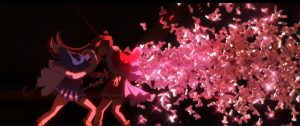 So what fixes Karen? Well, for one thing, Hikari makes a pretty stunning admission. When they were watching Starlight as children, little child actress Hikari was so in awe of it that she was afraid that she might not ever reach that level. So afraid that she nearly gave up, in fact! It took Karen’s dumb raw idealism and the insistence that they promise each other to do their own Starlight to snap Hikari out of it. If Karen hadn’t been there, Hikari might have given up on being a Stage Girl all the way back when she was five. That’s a pretty awesome revelation! It helps give Karen some amount of fulfillment that her promise wasn’t just an empty thing for herself. She unknowingly saved Hikari way back then!
So what fixes Karen? Well, for one thing, Hikari makes a pretty stunning admission. When they were watching Starlight as children, little child actress Hikari was so in awe of it that she was afraid that she might not ever reach that level. So afraid that she nearly gave up, in fact! It took Karen’s dumb raw idealism and the insistence that they promise each other to do their own Starlight to snap Hikari out of it. If Karen hadn’t been there, Hikari might have given up on being a Stage Girl all the way back when she was five. That’s a pretty awesome revelation! It helps give Karen some amount of fulfillment that her promise wasn’t just an empty thing for herself. She unknowingly saved Hikari way back then!
The other thing that fixes Karen is the thing that always fixes Karen: The idea that she can be reborn as a Stage Girl and face the next challenge. Karen, lovable as she is, is kinda a dummy who often does the right things without realizing the deeper why. I think Hikari’s revelation jumpstarted Karen and caused her to look back on all the fun and challenging times she had as a Stage Girl growing up. It caused Karen realize that, no, her stage was not just Hikari. Sure, doing Starlight with Hikari was a huge goal, but Karen was a real Stage Girl and a star long before she and Hikari met again at the start of the anime.
We see a scene where Karen’s three past selves deliver a tomato to her comatose self. The tomatoes all throughout the movie have represented the willingness and desire and sacrifice to take on the challenge of continuing to be a Stage Girl. Karen had ignored that tomato and walked away from those challenges, but now she had it back in hand. So, Karen goes back to the beginning. We literally see her become Position Zero. She has to ride through her brief storm of insecurity and doubt, but she comes through it just fine and is once again reborn as herself, but now she clearly remembers and cherishes everything it took to reach this point.
After all that, Karen’s post-transformation introduction is forward looking to new stages instead of being focused on the stages of Hikari and the Starlight play. Karen now realizes one last thing that she never even considered before. Now that she and Hikari are going their separate ways, they might just end up competing against each other for the same role. Up until now, Karen has maintained that they could pass their Starlight auditions together. Now, Karen realizes that if she ends up going against Hikari she will want to win. It’s Karen’s last step to becoming a true Stage Girl. And yes, this newfound desire to be the best rips apart Karen and Hikari’s Promise Tower, but the promise had already been fulfilled. It will always be great memory the two will share, but it cannot hold up to the reality of the new stages they are heading towards.
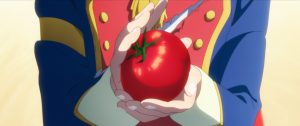 This is quite the departure from the series. It drags Karen a bit more into the real world. One where she knows she might have to defeat others in order to get the roles she wants. Even so, I think Karen will still be the lovable goofball who immediately came to check on and praise Junna for a job well done after their second Revue together. Karen will now try to win, but she won’t seek to destroy her opponents like some stars sometimes do.
This is quite the departure from the series. It drags Karen a bit more into the real world. One where she knows she might have to defeat others in order to get the roles she wants. Even so, I think Karen will still be the lovable goofball who immediately came to check on and praise Junna for a job well done after their second Revue together. Karen will now try to win, but she won’t seek to destroy her opponents like some stars sometimes do.
In the end, the top of the tower lands on Position Zero, and although Karen is empty from having accomplished her Starlight promise, Hikari tosses her a tomato. Karen can now fill herself up on the ambition of being a Stage Girl. She will be alright now, even as she moves into the real world beyond her childhood. And the movie ends.
Except it doesn’t! Stick around for the credits! We get to see where everybody ends up!
– Kaoruko inherits her position as the 12th Generation leader of the Senka-ryu dance school.
– Maya, Mahiru, and Futaba join the New National First Theater Troupe. (Maya can go anywhere she wants, I’m sure, but I’m a little surprised the other two got in!)
– Claudine joined the Theatre de Flamme in France. But, I’m thinking Maya came to visit at least once since Claudine has a cute little dove in her window.
– Junna did not go to a university literature department! She joined a New York Musical and Drama Academy and is dancing and having fun! Yay, Junna!
– And Banana? She joined the Royal Academy of Theatrical Actors… that’s where Hikari is studying! Maybe we can count on Banana (and Hikari?) giving that Judy Knightley, who ended Hikari’s quest to become a Top Star in the anime, a run for her money next time there are auditions? :p
– As for Hikari, she seemed to be traveling the world visiting her friends, but we last see her at her own Position Zero. There’s a ton of little hints throughout the movie that Hikari actually fully quit out of acting after doing Starlight with Karen, but now she is going back to it. I think it would be fun if she and Banana went from super rivals to best friends.
– And Karen? She has a new audition for a new role, but she’ll happily use her experiences of Starlight to help herself along! 🙂




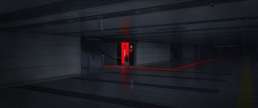
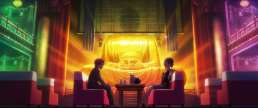


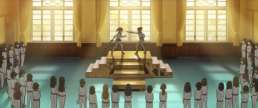
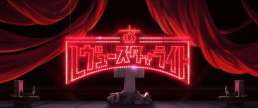
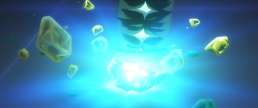

Thank you very much for your analysis, the work and dedication that you used is reflected in this review
Thanks so much! 🙂